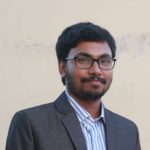Member Spotlight

Rajesh Kumar Das Institute of Information Sciences Noakhali Science and Technology University
What attracted you to information science as a profession and field of study?
I was attracted to information science as it gives me a lifetime opportunity to connect with people through the information and to study on the information phenomena that changes today’s world so fast. My professional interest as a faculty is that I am interested to help my students extracting intrinsic value from the real life data and information through such blended discipline.
In what area of information science do you practice, teach or do research? What about that area of practice/study made you choose it?
I am currently teaching Information Science as a lecturer at Noakhali Science and Technology University. I am particularly interested in studying and deploying latest teaching pedagogy for integrating into the classroom and the curricula. My long-term goal is to teach students learning the use of machine learning and artificial Intelligence from information science perspective. As a master’s thesis student at University of Dhaka I studied science mapping, bibliometrics, citation analysis and visualizations of information organization systems. The goal of my current research is to understand the usage of social media- from deploying novel approach to uncover the knowledge structure of data analytics that could help predicting future innovation pathways of social media through analytics.
Why did you join ASIS&T?
Information industry is constantly changing. To keep abreast with the current development and scientific advances in information domain, ASIS&T has been playing active role for nearly 80 years. It's a great opportunity for me creating synergy among the people from different geographic area and I would like to share, or to enrich my views to be validated by others through the membership of ASIS&T. It allows me to network with people through numerous events e.g. annual meeting, workshop, webinar and conferences in national, regional chapter organized by ASIS&T. I believe, contributing to the information science field through ASIS&T for the advancement of information science discipline and profession would be a very rewarding experience for me.
What advice would you give to young people contemplating information science as a potential profession or field of study?
Information science is a multi-disciplinary and ever-expanding field, which offers lot of career potentials in a variety of dimension and discipline as well. As a highly technical field of study and profession, it prepares students to analyze, implement, manage, use and disseminate the information in diverse technological environment focusing on human and societal perspective. From Machine learning and artificial intelligence perspective, potential student of information science have lot to do with data librarianship, management and analytics along with core information work for contributing to the information field to change the world. Therefore, potential students require to be tech-savvy, as well as human-centric for contemplating a profession in information science.
What do you think will be the biggest challenge for those working in information science in the next decade?
I think that the biggest challenge for those working in information science in the next decade will be dealing with linked data, machine learning, artificial intelligence and knowledge discovery system to cope-up with the ever-evolving paradigm shift of technologies. There will also be a growing challenge for them to be equipped with various skill set e.g. instructional & critical analytic skill, along with the discipline-specific skill and critical competencies e.g. programing and data competency, along with the core competency to sustain in a continually information management system. Moreover, the continued influence of technology will urge future information professional for adopting well-developed instructional skills and strategies to improve the data and/or information literacy skills for the data-driven decision-making of digital citizenry.
